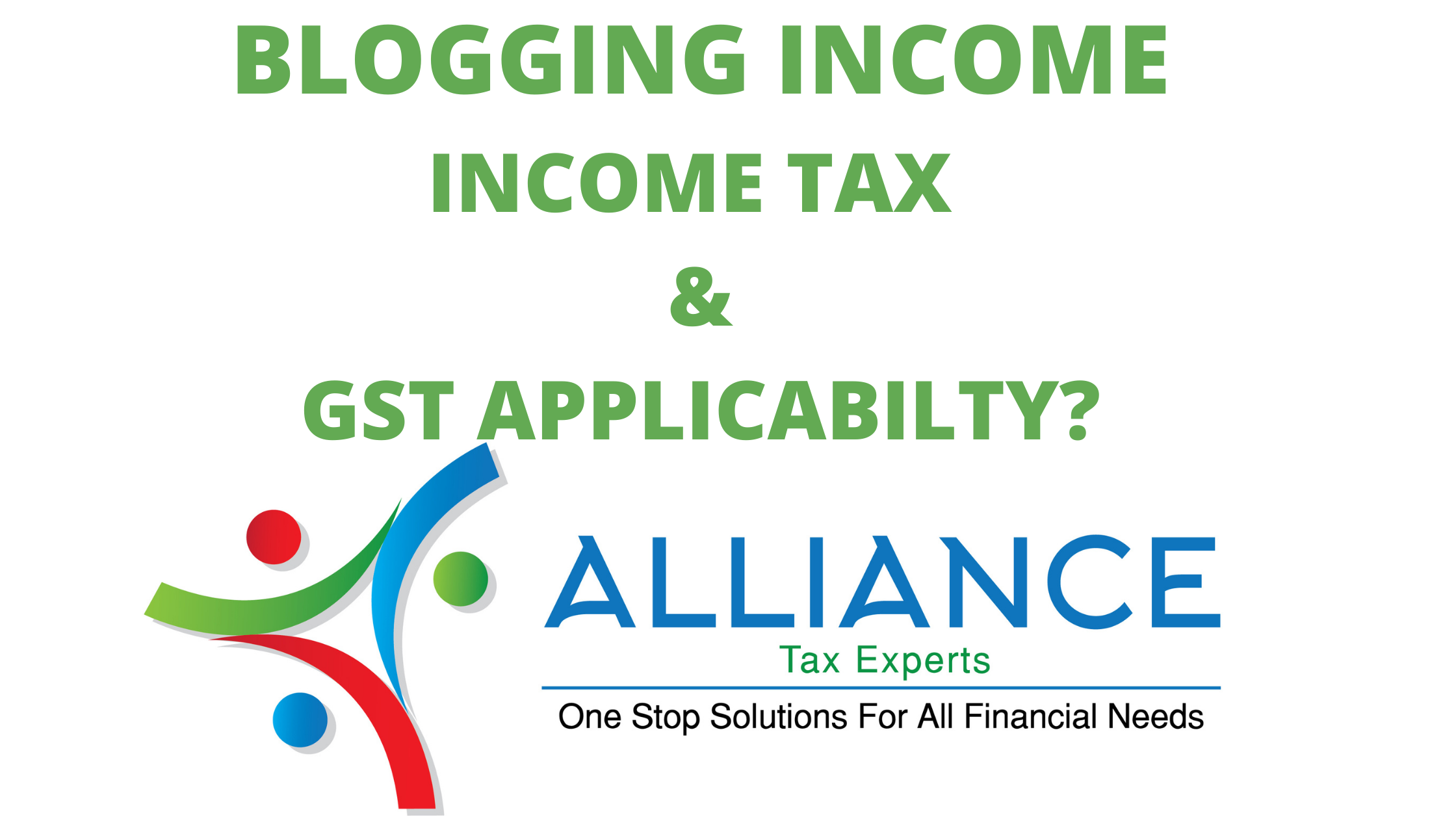
04 Oct
BLOGGING INCOME TAX AND GST APPLICABILTY
BLOGGING INCOME TAX AND GST APPLICABILITY
Today’s generation, also called millennials,
love to work for themselves. They like to be accountable, responsible and
independent. For the same reason, blogging has been gaining popularity for
these young professionals.
In this digital age, this business can be
very profitable as well as going to famous to you! Digital businessmen in India
can earn millions every month. Yes, you read that, right! Millions! Blogging
income is taxable under income tax law and should be considered when making
career decisions.
To help you choose the information you need
to know about the taxes on the income we receive from blogging
What is blogging?
The dictionary of blogging means ‘the
experiences, opinions or events in the lives of the writers on the website.
Recently, blogging has evolved into Vblogging in India with the help of
YouTube, which is nothing more than a video format of a blog. So, it is
Blogger's job to increase engagement and get visitors to publish content on
their website on a regular basis.
A source of income from blogging
You may be wondering if I have a website, but
how do I make money? How do I review my blog?
Your website is your primary business and
there are two ways to make money. Listed below are some resources that bloggers
can make money from –
- Sponsored Ads:
Once a blogger has created an identity and
audience for themselves, interested brands pay them to support the products
- Affiliate Marketing:
Brands pay bloggers to promote their products
or services. If a user buys a product or services through Blogger's website,
Blogger receives a mutually agreed amount.
- Advertising:
Bloggers can sell space on their websites to
advertisers to run ads. The process can be automated, where the highest bidder
wins the place
- Freelancing:
Bloggers can also do various freelancing
services in which they can collaborate with others and get paid for the
project.
How to calculate tax on income from blogging
Since you need to pay tax on the income you
get from blogging, you need to know that the income from blogging falls in the
business/Profession category. According to the Income Tax Act, the taxpayers
covered under this section are required to pay tax on the income earned except
for some acceptable expenses
Coming to allowable expenses, yes, there are
some expenses under this section that can help bloggers save money and the
revenue received under acceptable expenses will be taxable. Expenses allowed
paying tax on income earned through blogging-
-Domain hosting costs
-Employees'salaries
-Payments to consultants independently
-Convenience charges
-Office Rent (if taken)
-Utility expenses like electricity, phone
bills etc.
-Depreciation
As a blogger, you need to save receipts and
bills for payments that are subject to acceptable costs.
These payments should be such that they will
directly contribute to the business and income.
Let's take the example of a blogger named
after Sachin. Sachin is a travel blogger whose total annual income including
expenses is given below.
Source
of Income Annual Income
Travel
blogging
Rs.12,00,000.00
Now let us look at Sachin’s annual expenses
–
Particulars Money Spent (Annually)
Rent 1,00,000.00
Utilty Exp 1,50,000.00
Domain Hosting Charges 25,0000.00
Payment to Freelance Consultant 40,000.00
Depreciation 80,000.00
Salary of two employees 3,60,000.00
Total Expenses 7,55,000.00
NET TAXABLE INCOME 4,45,000.00
For Sachin, the net taxable income is Rs. 4,
45,000. Sachin has to pay taxes according to his tax slab. After that, Sachin
can make other investments in deductible mutual funds, PPFs, etc. under Section
80C of the Income Tax Act.
As a blogger, you need to pay advance tax (if
you are applicable) which means you have to pay income tax in the same year you
earn income. In addition, Blogger will be subject to taxes such as Goods and
Services Tax (GST) and Tax deduction Source (TDS).
FAQs
Q1. Is it mandatory for Blogger to
register under GST?
A1. If the total turnover of a blogger for a
Financial Year is 20 lakhs or more, then he has to register himself for GST.
Q 2. I have two separate websites. Do I
need GST registration for both?
A2. If both the websites are under the
same name then you do not need separate GST registration. Both the websites can
be listed under the same name while registering for GST
Q 3. Is it okay to transfer my Google Adsense
money to my savings account?
A 3. Yes, there is no limit to the amount you
can transfer from Google AdSense to your bank account. However, keep in mind
that all these transactions should be mentioned while submitting your ITR
Question 4. I blog part-time. Do I need to
share my secondary income while filing ITR?
A4:- Yes, You should show all your
income when filing an income tax return. The primary source of income, your
salary will come under the heading ‘Income Salary’ and freelancing blogging
money will come under the heading ‘Business / Business Income’.
Question 5. What happens if I don't show my
blogging income when I pay taxes?
A5. The income of blogging is taxable
by law, but it is essential to pay tax for the income earned from blogging. The
revenue from blogging comes under the heading 'Business / Business Revenue’. If
you fail to pay your income tax on time, you will be penalized under Section
234 A/B/C.
Alliance Tax Expert is a platform for tax
planning, income tax preparation and filing for individuals and businesses in
India. We provide income tax, GST, income tax audit, accounting and scrutiny
consultancy at nominal cost.
Contact
santoshpatil@alltaxfin.com
9769201316
#tax #taxes #accounting #business #taxseason
#finance #incometax #accountant #smallbusiness #entrepreneur #bookkeeping
#taxpreparer #gst #money #taxrefund #taxprofessional #taxreturn #pajak #payroll
#taxpreparation #audit #cpa #taxplanning #taxconsultant #covid
#alliancetaxexperts #businessowner #akuntansi #accountants #bhfyp